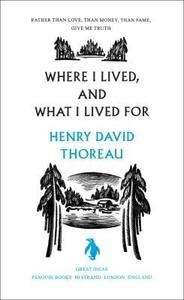Where I Lived and What I Lived for

Editorial Penguin UK
Colección Great Ideas, Número 0
Fecha de edición agosto 2005
Idioma inglés
EAN 9780141023977
112 páginas
Libro
encuadernado en tapa blanda
Resumen del libro
Throughout history, some books have changed the world. They have transformed the way we see ourselves - and each other. They have inspired debate, dissent, war and revolution.
They have enlightened, outraged, provoked and comforted. They have enriched lives - and destroyed them. Now Penguin brings you the works of the great thinkers, pioneers, radicals and visionaries whose ideas shook civilization and helped make us who we are.
Thoreau's account of his solitary and self-sufficient home in the New England woods remains an inspiration to the environmental movement - a call to his fellow men to abandon their striving, materialistic existences of 'quiet desperation' for a simple life within their means, finding spiritual truth through awareness of the sheer beauty of their surroundings.
Biografía del autor
Henry David Thoreau (1817-1862), filósofo y poeta estadounidense, nació en la ciudad de Concord (Massachusetts), en la familia de un pequeño empresario. Se graduó en la Universidad de Harvard, pero nunca se implicó mucho en los estudios.<br> A los veinte años entabló una amistad sólida con Emerson y, estimulado por el filósofo, que tuvo una gran influencia en Thoreau, se convirtió en poeta. Antes de empezar a publicar sus versos había ejercido la docencia y había trabajado en el negocio de fabricación de lápices de su padre.<br> Publicó algunos libros como Natural History of Massachusetts (1842) o Un paseo invernal (1843) x{0026} x02014;este último sobre una de sus actividades más queridas, caminarx{0026} x02014; y, cuando tenía veintisiete años, comenzó a construir una cabaña junto al lago Walden, en la que viviría durante dos años de forma autosuficiente, experiencia que recogió más tarde en Walden (1854), su obra más importante.<br> Asimismo, Thoreau fue un enérgico activista abolicionista y escribió un manifiesto que defiende la preeminencia de la conciencia individual sobre las leyes, Desobediencia civil (1849), uno de sus ensayos más célebres.








